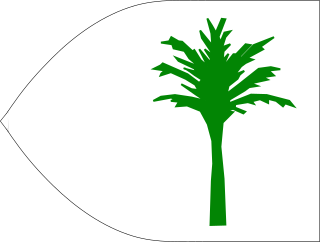
The Kanem–Bornu Empire existed in areas which are now part of Nigeria, Niger, Cameroon, Libya and Chad. It was known to the Arabian geographers as the Kanem Empire from the 8th century AD onward and lasted as the independent kingdom of Bornu until 1900.
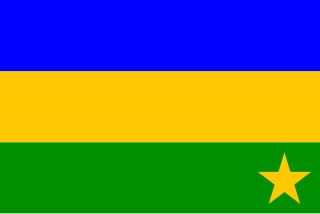
The Kanuri people are an African ethnic group living largely in the lands of the former Kanem and Bornu Empires in Niger, Nigeria, Chad, and Cameroon, as well as a diaspora community residing in Sudan. Those generally termed Kanuri include several subgroups and dialect groups, some of whom identify as distinct from the Kanuri. Most trace their origins to ruling lineages of the medieval Kanem–Bornu Empire, and its client states or provinces. In contrast to the neighboring Toubou or Zaghawa pastoralists, Kanuri groups have traditionally been sedentary, engaging in farming, fishing the Chad Basin, trade, and salt processing.

Borno State is a state in the North-East geopolitical zone of Nigeria. It is bordered by Yobe to the west for about 421 km, Gombe to the southwest for 93 km, and Adamawa to the south while its eastern border forms part of the national border with Cameroon for about 426 km. Its northern border forms part of the national border with Niger for about 223 km, mostly across the Komadougou-Yobe River, and its northeastern border forms all of the national border with Chad for 85 km ,.It is the only Nigerian state to border up to three countries. It takes its name from the historic emirate of Borno, with the emirate's old capital of Maiduguri serving as the capital city of Borno State. The state was formed in 1976 when the former North-Eastern State was broken up. It originally included the area that is now Yobe State, which became a distinct state in 1991.

Katagum is a town, a local government area and a traditional emirate in Bauchi State of north eastern Nigeria. The town is located on the northern bank of the Jama'are River, which is a tributary of the Hadejia. Most of the inhabitants are peoples from the Fulani, Kanuri, Karai-karai and Hausa tribes. The chief agricultural products include peanuts (groundnuts), sorghum, millet, rice, cowpeas, cotton, indigo, and gum arabic. Livestock include horses, cattle, goats, sheep, donkeys and a lot of poultry.

Rabih az-Zubayr ibn Fadl Allah or Rabih Fadlallah, usually known as Rabah in French, was a Sudanese warlord and slave trader who established a powerful empire east of Lake Chad, in today's Chad.
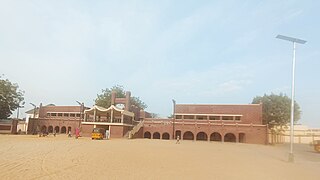
The Borno Emirate or Sultanate, sometimes known as the Bornu Emirate, is a traditional Nigerian state that was formed at the start of the 20th century. It is headed by the descendants of the rulers of the Bornu Empire, founded before 1000. The rulers have the title Shehu of Borno. The traditional emirate of Borno maintains a ceremonial rule of the Kanuri people, based in Maiduguri, Borno State, Nigeria, but acknowledged by the 4 million Kanuri in neighbouring countries.
Dikwa is a town and a local government area in Borno State, Nigeria.

Abu Bakr bin Ibrahim al-Kanemi CBE, was the Shehu of Bornu from 1902 to 1922.
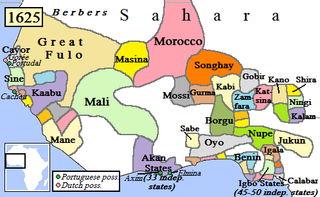
Nigerian traditional rulers often derive their titles from the rulers of independent states or communities that existed before the formation of modern Nigeria. Although they do not have formal political power, in many cases they continue to command respect from their people and have considerable influence in their community.

The Fika Emirate is a traditional state with headquarters in Potiskum, Yobe State, Nigeria. Dr. Muhammadu Abali Ibn Muhammadu Idrissa received his staff of office as 43rd Emir of Fika from Yobe governor Ibrahim Gaidam on 12 May 2010. The Emir is head of the Bole people.
Alhaji Muhammadu Abali Ibn Muhammadu Idrissa was appointed 13th Emir, or traditional ruler, of the Fika Emirate on 16 March 2009. The emir's palace is in Potiskum, Yobe State, Nigeria. The Emir is head of the Bole people.
The Biu Emirate is a traditional state based in Biu in Borno State, Nigeria. Prior to 1920 it was referred to as the Biu Kingdom.

TheGombe Emirate is a traditional state in Nigeria that roughly corresponds in area to the modern Gombe State.The current Emir of Gombe is Alhaji Abubakar Shehu Abubakar III, who acceded on 6 June 2014. The late Emir of Gombe, Alhaji Shehu Usman Abubakar, who precedes his father Abubakar II had been Emir since August 1984.

Shehu Umar Sanda ibn Ibrahim Kura al-Kanemi was the Shehu of Borno from 1922 to 1937. He was the son of Shehu Ibrahim Kura of Borno and brother of Shehu Abubakar Garbai.

Sir Umar Ibn Muhammad (1872–1967), also known as Sanda Kyarimi, was Shehu of Dikwa between 1922 and 1937 and Shehu of Borno from 1937 to 1967.

Shehu Mustafa Ibn Umar El-Kanemi was the Shehu of Borno from 1974 to 2009.
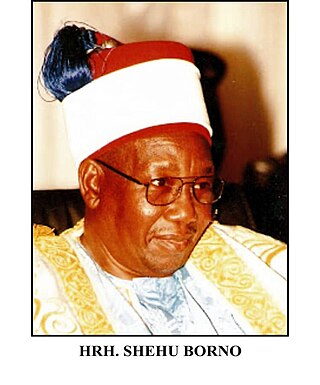
Abubakar Ibn Umar Garba Al Amin El-Kanemi Shehu Of Borno is the Shehu, or traditional ruler, of the Borno Emirate in northeast Nigeria.
The 2023 Borno State gubernatorial election took place on 18 March 2023, to elect the Governor of Borno State, concurrent with elections to the Borno State House of Assembly as well as twenty-seven other gubernatorial elections and elections to all other state houses of assembly. The election—which was postponed from its original 11 March date—was held three weeks after the presidential election and National Assembly elections. Incumbent APC Governor Babagana Umara Zulum has been renominated by his party.
The Borno Central senatorial district in Borno State, Nigeria covers the local government areas of Bama, Dikwa, Jere, Kaga, Kala/Balge, Konduga, Mafa, Maiduguri, and Ngala. The senator currently representing the district is Kaka Shehu Lawan, he was elected in 2023 under the platform of the All Progressives Congress, to succeed Vice President Kashim Shettima.

Muhammadu Mai Maina (1874–1964) was the first chief of Askira. He worked as an interpreter for the Northern Nigeria colonial government from 1895 to 1913, when he was appointed Chief of the Margi District in Bornu. In 1917, he resigned from this position and worked as a trader in Potiskum. Later, he founded the town of Askira and was appointed its chief in 1921, a position he held for over forty years. In 1958, he published Labarin Maimaina Na Jega, Sarkin Askira, a memoir about his early career as an interpreter. In 1961, he became a member of the Northern Region House of Chiefs.















